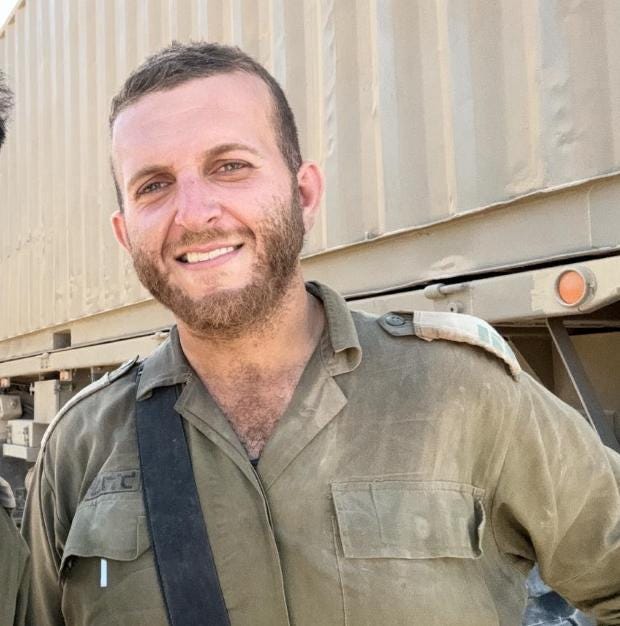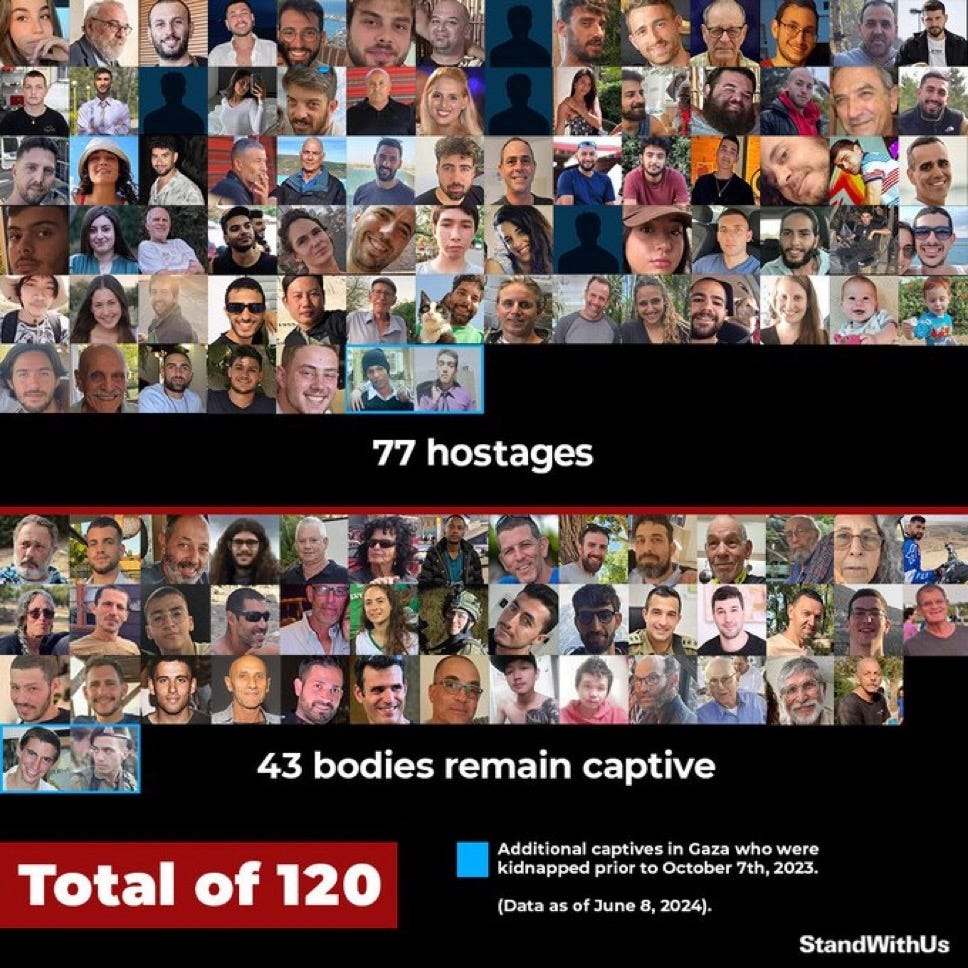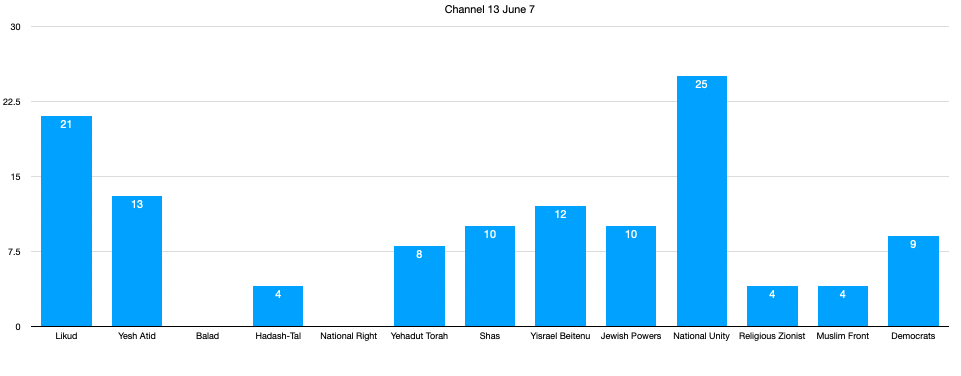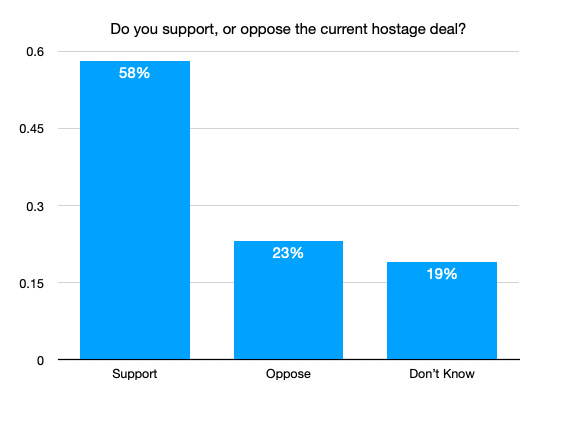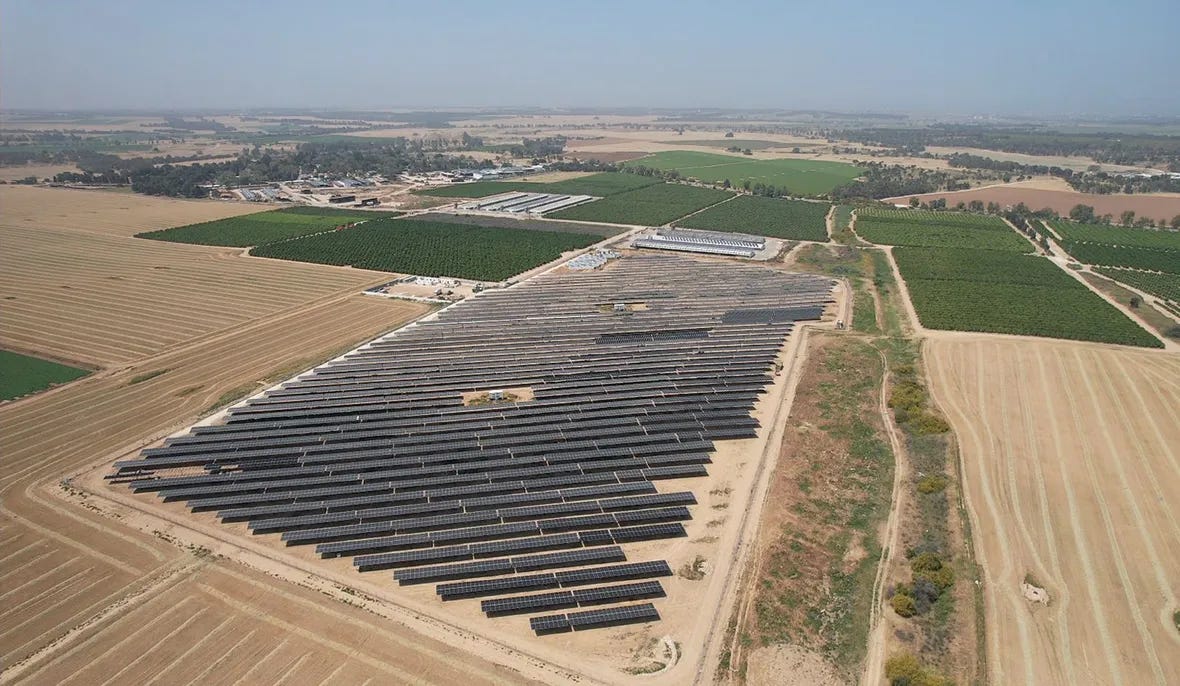DAY 275 OF THE WAR: Nine Months of War, Nine Months Hamas is Holding Our Hostages, Netanyahu Issues Unhelpful Statement
Tel Aviv Diary, July 7, 2024
Last night, I stated that it was unclear whether the Hezbollah member we assassinated was significant enough to provoke serious retaliation. We didn't have to wait long for the answer. Our attack occurred deep in Lebanon, and this morning, Hezbollah fired 20 rockets at areas around Tiberias, theoretically targeting a nearby military base. One person was seriously injured near Tiberias. A few hours later, Hezbollah fired another barrage aimed at the Air Force base on Mt. Meron. In the late afternoon, Hezbollah launched an anti-tank missile at Moshav Zarit along the northern border, wounding three people, one very seriously. Among the seriously wounded, is an American citizen, another is a soldier, and the third is an Israeli-born civilian.
Tonight, several drones dispatched by Hezbollah were all successfully intercepted by the IAF.
GAZA
Another soldier fell today in combat in Rafah. He was Major Jalaa Ibrahim (25), a group commander in the Engineering Corps. Once again, a Druze soldier has made the ultimate sacrifice for the State of Israel. It is reported that Ibrahim died from an anti-tank missile.
In addition, it was announced tonight that the commander of the 52nd Armored Battalion, Lt. Col. Daniel Eleh, was moderately injured today during a clash with terrorists in the Tel Sultan neighborhood in western Rafah. Eleh was evacuated to a hospital.
NATIONAL DISRUPTION AND HOSTAGES
Today was a full day of national disruption, to demand the immediate release of all the hostages.
Tonight, there was a large demonstration on behalf of the hostages.
This evening, Prime Minister Netanyahu’s office released the following statement:
Any agreement must permit Israel to resume fighting until all war objectives are achieved.
The smuggling of weapons for Hamas across the Gaza-Egypt border will be prohibited.
The return of thousands of armed militants to the northern Gaza Strip will not be permitted.
Israel will [do its best to] maximize the number of living hostages returned from Hamas captivity.
The framework agreed upon by Israel, which received President Biden’s endorsement, will enable Israel to recover hostages without compromising its other war objectives.
Item #3 on the list above is a new request, was not included in the original deal, and is opposed by the military, who believe that Hamas will not accept this condition.
In response to a statement released by Netanyahu’s office, Opposition Head Yair Lapid issued the following remarks:
I have one response to the Prime Minister's Office statement: What good does this do? We are at a critical moment in the negotiations; the hostages’ lives depend on it [this deal]. Why issue such a provocative statement? How does this contribute to the process?
There is a growing sense tonight that Netanyahu's unnecessary statement about the proposed hostage agreement is another attempt to derail the talks.
TENSE CABINET MEETING
This week’s cabinet meeting was unusually contentious, marked by several divisive disagreements brought to the fore. The first point of contention was an across-the-board 1% budget cut (to spare all the money allocated through coalition agreements). While Ministry of Finance professionals advocated for cutting coalition funds, Netanyahu refused and only agreed to go ahead with an across-the-board cut. The money will be used to finance extended benefits for those displaced from their homes in both the North and the South.
Here are some of the specific cuts discussed:
Transportation Ministry (Development) ..…. 70 million
Public Security Ministry ………………….… 41 million
Education Ministry ……………………..…… 37 million
Education Ministry (Development) ………… 19 million
Welfare Ministry ………………………..….… 27 million
Health Ministry …………………………….… 24 million
Netanyahu warned ministers that he would retaliate by not approving their trips abroad if they opposed this vote.
During the meeting, Galant implored, almost begged, the cabinet to agree to extend the mandatory military service period for Israelis back to 36 months. Galant explained once again that the demand for personnel had grown while the available manpower has decreased. Other cabinet members criticized Gallant for seeking broad support for a law that may or may not draft ultra-Orthodox into the Army. Galant shot back that the law concerning the ultra-Orthodox was about exemptions while extending the duration of military service would actually increase troop numbers.
Galant stated,
At this point, everyone in this room bears the responsibility to give the IDF the necessary conditions to continue fighting. The issue of manpower is the number one priority. Without that, there is nothing.
At the end of the cabinet meeting, Netanyahu attacked Galant, saying,
The person who gives the opposition veto power gives them the option of stopping conscription of the ultra-Orthodox with an agreement and thus lets them bring down the government. If the government falls, there would be no one to get back the hostages and win the war.
Galant later responded to Netanyahu’s criticism as follows:
This is a very critical moment. We must reach an agreement to bring back the hostages. The attempt to connect the issue of the ultra-Orthodox draft with an agreement to secure the release of the hostages is dangerous and irresponsible.
It should be noted that, by all accounts, Netanyahu genuinely believes that he is irreplaceable and that we will not win the war without him.
A related story that garnered attention today revolved around a recording of Minister Orit Stroock from the Religious Zionist Party, who stated,
It's a miracle how much we are accomplishing in the West Bank, but we must move forward quickly since we don't know how long this government will remain in power.
NETANYAHU’S ONGOING TRIAL
The prosecutors responded to the defense attorneys’ request to postpone Prime Minister Netanyahu’s testimony in his corruption trial until March 2025 due to the ongoing war. Prosecutors argued against the delay, requesting that the Prime Minister’s testimony begin on November 1. In their filing, Prosecutors demanded that Netanyahu explicitly state whether or not he is unable to fulfill his duties as Prime Minister while also being on trial. They pointed out the inconsistency in Netanyahu’s current claim of being unable to manage both responsibilities, given his previous assertions When the Supreme Court considered whether Netanyahu could serve as Prime Minister while on trial, Netanyahu insisted that he was fully capable of handling both roles simultaneously.
NINE MONTHS OF HELL
Today marks nine months since the war began. It's very hard to believe that it's been so long, yet it's also hard to recall a time before this war. These have been the most challenging nine months in Israel’s history.
It's a strange time. Today, Tel Aviv’s cafes are filled with customers once again. Nevertheless, it remains nearly impossible to escape our depressing reality. Hostage Square is in the center of Tel Aviv, and as I have written before, I walk through the square almost every morning. Each day, I look at the time counter and can’t believe how long this war has been. It’s unfathomable that so many people are still being held captive by some of the most reprehensible people in the world.
Nine months have elapsed, and yet the same government that failed us on October 7th remains in power. Nine months later, every high-ranking officer of the IDF continues to serve, most in the same positions they held on that horrific day in October. It's impossible to believe, but this is the reality we face.
Moreover, this has been the worst war in Israel’s history. It’s longer than the duration of actual fighting during the War of Independence. It is also apparent that this will be the first war where Israel ends in a strategically worse position than where we began. The government has never been willing to admit that we effectively lost this war on the first day when Hamas kidnapped over 200 hostages. The only way to have reversed that situation would have been to rescue most of the hostages, which we have failed to do.
I won’t detail all of our failures in this war, but it’s been a long time since we’ve faced such international isolation — most Israelis are not even aware of this worldwide rift. However, this isolation is palpable, especially if you are an academic trying to present a paper abroad, or a high-tech company attempting to secure an international agreement. This does not even begin to address how exhausted our Army is and how reservists, who served for 200 days, are struggling to manage their professional and home lives.
The bottom line is that Israel must find a way to end this war, instead of pursuing an unattainable “definitive victory”. Unfortunately, we have politicians and military leaders who are trying to rehabilitate their reputations with a successful war effort. In reality, however, they are merely ensuring that future generations will learn about the self-serving leaders who brought us to the brink of defeat.
TODAY’S OPINION POLLS
The following charts present Channel 13's election forecast if the elections were held today
:
ECONOMY
Scitex is about to end its operations as an independent company and finalize its full integration into HP Indigo. This move is expected to result in significant reductions in the company’s workforce, which numbers around 200 people in Israel, and possibly affect the operations of the plants in Caesarea and Kiryat Gat. David Tomer, the manager of Scitex, is expected to leave the company as part of the process.
This move completes a process that began in 2022, when HP announced the establishment of a digital printing division that includes Indigo, Scitex, and PageWide, led by Haim Levitt. HP decided to take a step forward and subordinate Scitex directly to Indigo, which is managed by Noam Zilberstein, and now the integration process is accelerating.
Founded in 1968, Scitex was one of Israel’s first non-defense sector hi-tech companies. By the early 1990’s it had three main divisions concentrating in the digital printing business which it was a world leader. Over the years Scitex’s divisions were sold off to multinationals, the last of which was bought by HP in 2008.
BUSINESS
The renewable energy company Enlight is expanding its operations in Israel. Enlight has begun the commercial operation of solar projects combined with energy storage in Yesha and Re’im in the western Negev, with a total capacity of 16 megawatts and a storage capacity of 94 megawatt-hours. With their activation, Enlight’s array of solar projects combined with storage connected to the national electricity grid will number nine projects.
With the activation of the projects in Yesha and Re’im, Enlight now has four projects that have been connected to the electricity grid in the Gaza border area since October 2023. Enlight notes that despite delays in construction due to the security situation in the area, the projects were connected earlier than planned. In addition to the nine solar storage projects already connected to the grid, Enlight is developing three more similar projects expected to begin commercial operation in 2024.
–––––∞––––––∞––––––∞––––––∞––––––∞––––––∞––––––∞––––––
A PIECE OF HISTORY
Mivtza Din V’Chesh’bone,” Operation Accountability
Operation Accountability, launched by Israel against Hezbollah in southern Lebanon in July 1993, was a response to escalating tensions and attacks along the Israel-Lebanon border. The operation, known in Hebrew as "Mivtza Din V’Chesh’bone," was initiated after weeks of warnings to Hezbollah to cease rocket attacks on Israeli territory. The immediate trigger was a series of Hezbollah attacks on IDF positions, resulting in casualties, followed by the firing of 40 Katyusha rockets into Israel.
The Israeli response began on July 25, 1993, with airstrikes on Hezbollah targets, followed by artillery bombardments aimed at driving civilians away from areas used by Hezbollah. The IDF reportedly took measures to minimize civilian casualties, including providing warnings and time for evacuation. However, the operation caused significant damage to Lebanon's civilian infrastructure, forcing tens of thousands to flee northward and drawing international criticism.
The fighting lasted for one week, during which Israel targeted terrorist hubs and villages used as Hezbollah headquarters. The conflict resulted in casualties on both sides, with reports varying slightly between accounts. Israel reported 50 terrorists killed and 40 wounded, while suffering one to two civilian deaths, one IDF fatality, and several wounded soldiers. Hezbollah retaliated with Katyusha rocket fire, causing civilian casualties in northern Israel.
The operation concluded on July 31, 1993, following U.S.-brokered ceasefire negotiations involving Israel, Syria, Lebanon, and Hezbollah. The agreement included pledges from Lebanon and Syria to curb Hezbollah activities, while Israel agreed to limit its military incursions into Lebanon. Despite these understandings, the ceasefire proved short-lived, with continued Hezbollah aggression eventually leading to another Israeli operation, “Anvei Za’am” (Grapes of Wrath), three years later.




